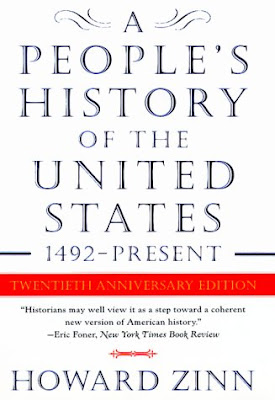
This book is very biased, and Zinn writes a disclaimer admitting it. His goal with this book was to tell the story of the oppressed, rather than from the sugarcoated perspective we normally see in history. I would not recommend you start this if you don't already know a thing or two about American history already, so that you can fairly weigh his arguments and disagree with them if you want. For example, I felt that his treatment of the founders was a little unfair. He criticizes them for forming a republic that mostly benefited the elite (true), rather than focusing a social democracy. While certainly valid, I felt that it was a little unfair since Marx and Engels wouldn't write the manifesto until a century later, and they were never exposed to those ideas.
I'm still not through with it yet. It's pretty massive. But that's the great thing about most nonfiction. You can put it down and pick it back up over the course of a few months, like with I've been doing. I'm in the late 1800s/early 1900s right now, and he's going over all the union struggles, and the government's collaboration with business to stamp them out. I'm learning a shit ton of great new info that all my other history books completely breezed over. This book is pretty essential if you want a full picture.
Zinn has a companion book called Voices of a People's History of the United States, which I haven't picked up yet. It's a collection of essays, letters, speeches, and other forms of written word, directly out of the mouths of the people who lived in the eras. I can't wait. Here's an excellent excerpt I found on youtube. This is Josh Brolin reading a statement from pre-Civil War hero John Brown at his court hearing, who led armed insurrection at Harper's Ferry in the hopes of sparking a slave revolution.
And here's Sandra Oh reading Yuri Kochiyama, a Japanese American who was put into a concentration camp during World War II. I couldn't decide which video I liked better, so yeah here's both. Can you understand why I can't fucking wait to get to this? I mean Christ, this almost made me tear up.

You can skip over the history stuff if you're not into it, but Empire of Illusion is an absolutely must-read. Hedges describes in excruciating detail just how braindead our society is, and attempts to explain how we got here. This is very grim. He makes a convincing argument that everything is basically hopeless, and all it will take for fascism to arise in the United States is one more 9/11-type disaster, and a demagogue to take advantage of it. He sees little hope, and is convinced that if drastic action is not taken immediately to counteract this illiterate, delusional society, we'll just slip further and further, and soon go the way of Weimar.

I feel that it's a little unsafe to base your entire worldview on only one person, but I really can't help it in this case. In high school it was Gandhi, and now I guess it's becoming Noam Chomsky. Reading this book has shifted the lens through which I view the world. You can't say that very many times throughout your life. This is what changed me from being disappointed with Obama and the Democratic party, to advocating tearing down the entire bullshit corrupt corporatist system, and starting anew. This is what convinced me that socialism is a good idea. Understanding Power is a collection of lectures Chomsky has given over the decades, and given that all of his opinions are in one compact place, this seems like the best place to start with him. Can't recommend it enough.


No comments:
Post a Comment